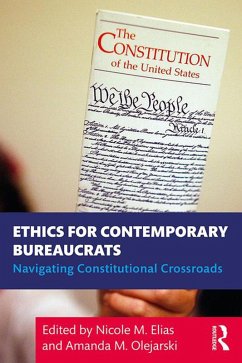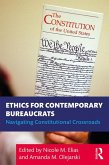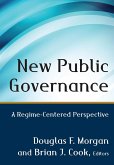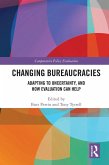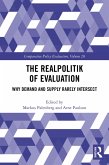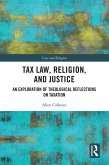Ethics for Contemporary Bureaucrats (eBook, PDF)
Navigating Constitutional Crossroads
Redaktion: Elias, Nicole; Olejarski, Amanda
40,95 €
40,95 €
inkl. MwSt.
Sofort per Download lieferbar

20 °P sammeln
40,95 €
Als Download kaufen

40,95 €
inkl. MwSt.
Sofort per Download lieferbar

20 °P sammeln
Jetzt verschenken
Alle Infos zum eBook verschenken
40,95 €
inkl. MwSt.
Sofort per Download lieferbar
Alle Infos zum eBook verschenken

20 °P sammeln
Ethics for Contemporary Bureaucrats (eBook, PDF)
Navigating Constitutional Crossroads
Redaktion: Elias, Nicole; Olejarski, Amanda
- Format: PDF
- Merkliste
- Auf die Merkliste
- Bewerten Bewerten
- Teilen
- Produkt teilen
- Produkterinnerung
- Produkterinnerung

Bitte loggen Sie sich zunächst in Ihr Kundenkonto ein oder registrieren Sie sich bei
bücher.de, um das eBook-Abo tolino select nutzen zu können.
Hier können Sie sich einloggen
Hier können Sie sich einloggen
Sie sind bereits eingeloggt. Klicken Sie auf 2. tolino select Abo, um fortzufahren.

Bitte loggen Sie sich zunächst in Ihr Kundenkonto ein oder registrieren Sie sich bei bücher.de, um das eBook-Abo tolino select nutzen zu können.
Ethics for Contemporary Bureaucrats is organized around three constitutional values: freedom, property, and social equity. These themes are based on emerging trends in public administration and balanced with traditional ethical models.
- Geräte: PC
- ohne Kopierschutz
- eBook Hilfe
- Größe: 6.8MB
Andere Kunden interessierten sich auch für
![Ethics for Contemporary Bureaucrats (eBook, ePUB) Ethics for Contemporary Bureaucrats (eBook, ePUB)]() Ethics for Contemporary Bureaucrats (eBook, ePUB)40,95 €
Ethics for Contemporary Bureaucrats (eBook, ePUB)40,95 €![New Public Governance (eBook, PDF) New Public Governance (eBook, PDF)]() Douglas MorganNew Public Governance (eBook, PDF)46,95 €
Douglas MorganNew Public Governance (eBook, PDF)46,95 €![Changing Bureaucracies (eBook, PDF) Changing Bureaucracies (eBook, PDF)]() Changing Bureaucracies (eBook, PDF)42,95 €
Changing Bureaucracies (eBook, PDF)42,95 €![The Realpolitik of Evaluation (eBook, PDF) The Realpolitik of Evaluation (eBook, PDF)]() The Realpolitik of Evaluation (eBook, PDF)42,95 €
The Realpolitik of Evaluation (eBook, PDF)42,95 €![Administrative Law for Public Managers (eBook, PDF) Administrative Law for Public Managers (eBook, PDF)]() David H. RosenbloomAdministrative Law for Public Managers (eBook, PDF)37,95 €
David H. RosenbloomAdministrative Law for Public Managers (eBook, PDF)37,95 €![Tax Law, Religion, and Justice (eBook, PDF) Tax Law, Religion, and Justice (eBook, PDF)]() Allen CalhounTax Law, Religion, and Justice (eBook, PDF)42,95 €
Allen CalhounTax Law, Religion, and Justice (eBook, PDF)42,95 €![Unmasking Administrative Evil (eBook, PDF) Unmasking Administrative Evil (eBook, PDF)]() Danny L. BalfourUnmasking Administrative Evil (eBook, PDF)52,95 €
Danny L. BalfourUnmasking Administrative Evil (eBook, PDF)52,95 €-
-
-
Ethics for Contemporary Bureaucrats is organized around three constitutional values: freedom, property, and social equity. These themes are based on emerging trends in public administration and balanced with traditional ethical models.
Dieser Download kann aus rechtlichen Gründen nur mit Rechnungsadresse in A, B, BG, CY, CZ, D, DK, EW, E, FIN, F, GR, HR, H, IRL, I, LT, L, LR, M, NL, PL, P, R, S, SLO, SK ausgeliefert werden.
Produktdetails
- Produktdetails
- Verlag: Taylor & Francis eBooks
- Seitenzahl: 230
- Erscheinungstermin: 2. Juni 2020
- Englisch
- ISBN-13: 9781000041118
- Artikelnr.: 59562027
- Verlag: Taylor & Francis eBooks
- Seitenzahl: 230
- Erscheinungstermin: 2. Juni 2020
- Englisch
- ISBN-13: 9781000041118
- Artikelnr.: 59562027
- Herstellerkennzeichnung Die Herstellerinformationen sind derzeit nicht verfügbar.
Nicole M. Elias, PhD, is an assistant professor in the Department of Public Management at John Jay College of Criminal Justice, CUNY and Founding Co-Director of Women in the Public Sector. Her research focuses on social equity in public administration and policy, with an emphasis on ethics of administration, management of human resources in public organizations, and public policy impacts on different populations. She regularly collaborates with practitioners in government agencies and non-profit organizations. She is a research partner with the New York City Commission on Gender Equity. Dr. Elias held a research fellowship at the U.S. Equal Employment Opportunity Commission Office, U.S. Department of Defense Equal Opportunity Management Institute (DEOMI), and served as the Lead Faculty Advisor to the U.S. Office of Personnel Management on the 2016 Government-wide Inclusive Diversity Strategic Plan. Dr. Elias is the author of numerous journal articles, book chapters, government reports, and practitioner training modules on means of fostering greater representation and inclusion in public service. Amanda M. Olejarski, PhD, is the Department Chair and MPA Director at West Chester University and teaches graduate and doctoral courses in public policy and administration. Her research has been published in Public administration Review, American Review of Public Administration, Administration & Society, among others. She is the author of two books on ethical decision-making. Olejarski serves as Immediate Past President of the Keystone State ASPA Chapter, chair of NASPAA's Pi Alpha Alpha Committee, and managing editor of Public Integrity. Originally from New Jersey, she lives in King of Prussia, PA with her husband, sons, and rescue cats. She enjoys gardening and Wawa.
Figures
Tables
Foreword: Camilla Stivers
Acknowledgements
Editor Biographies
Contributor Biographies
Introduction: The Constitutional Tradition in Public Administration Ethics
Larkin Dudley, Nicole M. Elias & Amanda Olejarksi
I. Freedom: Calling Health, Safety, and Financial Security into Question
1. Civil Servants on the Front-lines of Greenhouse Gas Regulation: The
Responsibilities of Public Administrators to Protect the Public in the Face
of Recalcitrant Political Institutions
Michelle C. Pautz, Ph.D.
2. Regime Values in Disaster Management
Patrick S. Roberts
3. Advancing Administrative Ethics Through Needs-Based Budgeting Practice
Dr. Kate Preston Keeney & Dr. Michael S. Keeney
4. Freedom v. Fairness: How Unresolved Normative Tension Contributed to the
Collapse of the U.S. Housing Market in 2008 -- and Policymaker Inability to
Reform It a Decade On
Susan W. Gates
II. Property: New Forms of Property Reinvigorating Longstanding Debates
5. Due Process and Property: What Process Due?
Amanda M. Olejarski & Sue M. Neal
6. Property, Intellectual Property and Ethics in Public Administration
Sara R. Jordan
7. Privacy as a Supra-Regime Value: The Ethical argument for a new
evolution of regime values to better protect financial privacy in local
governments,
Mike Potter, Ph.D.
8. Property and Emerging Institutional Types: The Challenge of Private
Foundations in Public Higher Education
Kathryn E. Webb Farley
III. Social Equity: The New Frontier of Diversity and Inclusion
9. Non-binary Gender Identity: Challenging Public Values and Reshaping
Institutions
Nicole M. Elias & Gwendolyn Saffran
10. Social Equity and Voting Rights: A Shrinking Regime
Susan T. Gooden & Dr. Brandy Faulkner
11. A Proposal for Strategic Controls to Ensure Equity in the Criminal
Justice System
Henry Smart III, Ph.D.
12. Advancing Equity through Increased Access to Residential Broadband
Daniel Boden & Roy Kirby
Conclusion: Where the Constitution Can Lead Us
Nicole M. Elias, Amanda M. Olejarski & Sue M. Neal
Tables
Foreword: Camilla Stivers
Acknowledgements
Editor Biographies
Contributor Biographies
Introduction: The Constitutional Tradition in Public Administration Ethics
Larkin Dudley, Nicole M. Elias & Amanda Olejarksi
I. Freedom: Calling Health, Safety, and Financial Security into Question
1. Civil Servants on the Front-lines of Greenhouse Gas Regulation: The
Responsibilities of Public Administrators to Protect the Public in the Face
of Recalcitrant Political Institutions
Michelle C. Pautz, Ph.D.
2. Regime Values in Disaster Management
Patrick S. Roberts
3. Advancing Administrative Ethics Through Needs-Based Budgeting Practice
Dr. Kate Preston Keeney & Dr. Michael S. Keeney
4. Freedom v. Fairness: How Unresolved Normative Tension Contributed to the
Collapse of the U.S. Housing Market in 2008 -- and Policymaker Inability to
Reform It a Decade On
Susan W. Gates
II. Property: New Forms of Property Reinvigorating Longstanding Debates
5. Due Process and Property: What Process Due?
Amanda M. Olejarski & Sue M. Neal
6. Property, Intellectual Property and Ethics in Public Administration
Sara R. Jordan
7. Privacy as a Supra-Regime Value: The Ethical argument for a new
evolution of regime values to better protect financial privacy in local
governments,
Mike Potter, Ph.D.
8. Property and Emerging Institutional Types: The Challenge of Private
Foundations in Public Higher Education
Kathryn E. Webb Farley
III. Social Equity: The New Frontier of Diversity and Inclusion
9. Non-binary Gender Identity: Challenging Public Values and Reshaping
Institutions
Nicole M. Elias & Gwendolyn Saffran
10. Social Equity and Voting Rights: A Shrinking Regime
Susan T. Gooden & Dr. Brandy Faulkner
11. A Proposal for Strategic Controls to Ensure Equity in the Criminal
Justice System
Henry Smart III, Ph.D.
12. Advancing Equity through Increased Access to Residential Broadband
Daniel Boden & Roy Kirby
Conclusion: Where the Constitution Can Lead Us
Nicole M. Elias, Amanda M. Olejarski & Sue M. Neal
Figures
Tables
Foreword: Camilla Stivers
Acknowledgements
Editor Biographies
Contributor Biographies
Introduction: The Constitutional Tradition in Public Administration Ethics
Larkin Dudley, Nicole M. Elias & Amanda Olejarksi
I. Freedom: Calling Health, Safety, and Financial Security into Question
1. Civil Servants on the Front-lines of Greenhouse Gas Regulation: The
Responsibilities of Public Administrators to Protect the Public in the Face
of Recalcitrant Political Institutions
Michelle C. Pautz, Ph.D.
2. Regime Values in Disaster Management
Patrick S. Roberts
3. Advancing Administrative Ethics Through Needs-Based Budgeting Practice
Dr. Kate Preston Keeney & Dr. Michael S. Keeney
4. Freedom v. Fairness: How Unresolved Normative Tension Contributed to the
Collapse of the U.S. Housing Market in 2008 -- and Policymaker Inability to
Reform It a Decade On
Susan W. Gates
II. Property: New Forms of Property Reinvigorating Longstanding Debates
5. Due Process and Property: What Process Due?
Amanda M. Olejarski & Sue M. Neal
6. Property, Intellectual Property and Ethics in Public Administration
Sara R. Jordan
7. Privacy as a Supra-Regime Value: The Ethical argument for a new
evolution of regime values to better protect financial privacy in local
governments,
Mike Potter, Ph.D.
8. Property and Emerging Institutional Types: The Challenge of Private
Foundations in Public Higher Education
Kathryn E. Webb Farley
III. Social Equity: The New Frontier of Diversity and Inclusion
9. Non-binary Gender Identity: Challenging Public Values and Reshaping
Institutions
Nicole M. Elias & Gwendolyn Saffran
10. Social Equity and Voting Rights: A Shrinking Regime
Susan T. Gooden & Dr. Brandy Faulkner
11. A Proposal for Strategic Controls to Ensure Equity in the Criminal
Justice System
Henry Smart III, Ph.D.
12. Advancing Equity through Increased Access to Residential Broadband
Daniel Boden & Roy Kirby
Conclusion: Where the Constitution Can Lead Us
Nicole M. Elias, Amanda M. Olejarski & Sue M. Neal
Tables
Foreword: Camilla Stivers
Acknowledgements
Editor Biographies
Contributor Biographies
Introduction: The Constitutional Tradition in Public Administration Ethics
Larkin Dudley, Nicole M. Elias & Amanda Olejarksi
I. Freedom: Calling Health, Safety, and Financial Security into Question
1. Civil Servants on the Front-lines of Greenhouse Gas Regulation: The
Responsibilities of Public Administrators to Protect the Public in the Face
of Recalcitrant Political Institutions
Michelle C. Pautz, Ph.D.
2. Regime Values in Disaster Management
Patrick S. Roberts
3. Advancing Administrative Ethics Through Needs-Based Budgeting Practice
Dr. Kate Preston Keeney & Dr. Michael S. Keeney
4. Freedom v. Fairness: How Unresolved Normative Tension Contributed to the
Collapse of the U.S. Housing Market in 2008 -- and Policymaker Inability to
Reform It a Decade On
Susan W. Gates
II. Property: New Forms of Property Reinvigorating Longstanding Debates
5. Due Process and Property: What Process Due?
Amanda M. Olejarski & Sue M. Neal
6. Property, Intellectual Property and Ethics in Public Administration
Sara R. Jordan
7. Privacy as a Supra-Regime Value: The Ethical argument for a new
evolution of regime values to better protect financial privacy in local
governments,
Mike Potter, Ph.D.
8. Property and Emerging Institutional Types: The Challenge of Private
Foundations in Public Higher Education
Kathryn E. Webb Farley
III. Social Equity: The New Frontier of Diversity and Inclusion
9. Non-binary Gender Identity: Challenging Public Values and Reshaping
Institutions
Nicole M. Elias & Gwendolyn Saffran
10. Social Equity and Voting Rights: A Shrinking Regime
Susan T. Gooden & Dr. Brandy Faulkner
11. A Proposal for Strategic Controls to Ensure Equity in the Criminal
Justice System
Henry Smart III, Ph.D.
12. Advancing Equity through Increased Access to Residential Broadband
Daniel Boden & Roy Kirby
Conclusion: Where the Constitution Can Lead Us
Nicole M. Elias, Amanda M. Olejarski & Sue M. Neal
